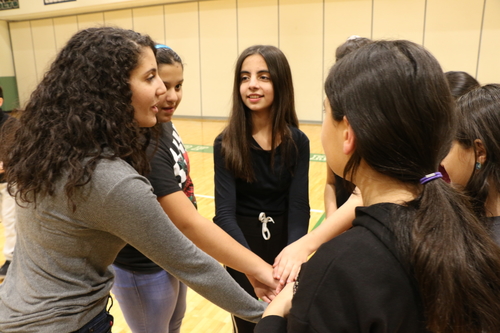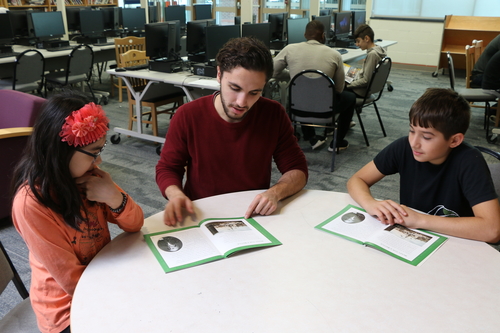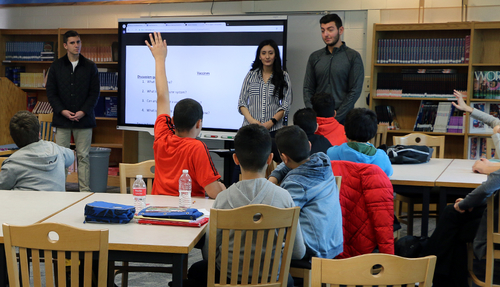
As soon as the school year begins, refugee youth at one metro Detroit middle school start asking officials when the students will arrive from Oakland University William Beaumont School of Medicine.
The reason?
The Sterling Heights, Michigan-based Grissom Middle School students are excited for Score for Success, a unique after-school program run by OUWB medical students who volunteer for three hours, every other Friday.
During the program, participating refugee middle schoolers get help with academics and literacy and talk about health and wellness issues, before everyone heads to the school’s gym to play sports like basketball and soccer.
Score for Success, which started on paper as an OUWB internship project in 2017, just kicked off its third year with a record 40 participants, and shows no sign of slowing.
“At the beginning of the school year, we have kids asking ‘When are the medical students coming in? When is Score for Success going to be up and running?’” said Grissom Middle School Principal Elizabeth Iljkoski.
“It’s now part of our culture, part of what we do here, and the kids take a lot of pride in being identified among those who get to participate in (Score for Success),” she said.
Grissom student Adrian Ibraheem is among the students who say they look forward to the program all week.
“I like how you can do your homework with medical students,” he said. “I also like how we go to the gym…everyone likes that.”
OUWB students also share that excitement about the program.
Second-year OUWB medical student Anna Jahshan is one of this year’s program leaders. Jahshan said that in her youth, she came to the U.S. from outside the U.S.
“I struggled when I first came here, especially in elementary school,” she said. “I wanted to give back for all those who helped me get through it and get to where I am.”
Jahshan said she participated in the program last year and finds it rewarding. She hopes students enjoy the program, but also get something out of it.
“It (the results) can be better reading skills or something else like simply providing them someone to talk to,” she said. “I know a lot of them struggle with making friends…due to language barriers and things like that. Sometimes they just like having someone to talk to.”
From paper to practice
“Tutoring Program for At-Risk Refugee Youths in the Detroit Metropolitan Area” was the name of the feasibility study prepared in the summer of 2017 by Nabiha Hasmi and Jeff Triska — who are now both M4s — as a requirement for their OUWB Refugee Health Internship.
As the study notes, a refugee “is someone who has been forced to flee his or her country because of persecution, war or violence, as defined by the United Nations High Commissioners for Refugees.” The study also notes that Michigan is the fourth largest recipient of refugees in the U.S.
“The OUWB Refugee Health Internship was important for us to better understand the complexities of the refugee experience and therefore, its implications on their health,” the study says. “Medical students are interested in and want to be involved in aiding the increased number of refugees who will be our patients and are new to (the) metropolitan Detroit area. We are incredibly interested in putting together a program in which we could address a need of the newly arrived refugees.”
 Grissom Middle School made sense for the project, the study indicates, because “Sterling Heights comprises a significant portion of refugees and immigrants.”
Grissom Middle School made sense for the project, the study indicates, because “Sterling Heights comprises a significant portion of refugees and immigrants.”
"We were able to identify the specific needs of the community and local organizations that could provide the resources necessary to address these needs," Triska said. "Through our partnership with The Chaldean Community Foundation, we found incredible people who wanted to help out and did so by helping provide funding and volunteers for tutoring and coaching."
By Thanksgiving 2017, Rachel Yoskowitz, assistant professor, Department of Foundational Medical Studies, and coordinator of Community and Global Health, and the OUWB students had coordinated with school officials to make the project a reality at Grissom.
OUWB M3 Caroline Vokos, a member of the Score for Success executive board, said when the program launched, there were more medical students than middle schoolers.
However, it wouldn’t take long for that to change.
Growth in popularity
Grissom Middle School Principal Elizabeth Iljkoski said Score for Success is open only to Grissom students born outside the U.S. This year, that meant about 250 of Grissom’s 771 students were invited. Only the first 40 to respond were allowed to participate. By comparison, there were about a dozen middle schoolers in the first year of Score for Success.
The three hours of the program essentially are split in two with the first half held in Grissom’s media center and the second half held in the gym.
Though the basic structure remains, Vokos said the program has evolved.
For example, in the first year of the program, OUWB students essentially served as tutors during the first half of the three hours. Vokos said it was decided last year to instead put emphasis on literacy.
“These kids are very good at math and science, but their biggest issue is reading,” said OUWB M3 Mustafa Polat, another member of the program’s board. “A lot of them, especially if they’re refugees or immigrants, they’ve just tried to stay alive and make it, so they didn’t go to school for a few years.”
Vokos added that “it really manifested itself when you see them flying through math problems, but then they have really big struggles when they try and tackle word-based math problems.”
“That was a very clear indication that reading was the biggest issue,” she said.
 Another way the program has changed is through the addition of a “mythbusters” segment where OUWB students address a health/wellness issue. Every week is a different topic.
Another way the program has changed is through the addition of a “mythbusters” segment where OUWB students address a health/wellness issue. Every week is a different topic.
“The original feasibility study provided a general idea of some gaps and identified a population that was in need,” Vokos said. “We took that and learned along the way…things they responded well to, or didn’t respond well to.”
It seems to be working. During an Oct. 18 presentation on vaccines, the middle schoolers were engaged in what the OUWB students were saying and asked many questions. Some of them appeared to go from being completely terrified of flu shots to wanting to get one immediately.
“As med students, we offer them an opportunity to comfortably ask their questions about health and health concepts,” Polat said. “They might not have the same ability at a doctor’s office when their parents are leading the conversation.”
Looking ahead
OUWB students involved with Score for Success say they look forward to the program continuing for many years.
“Every year more Grissom students are signing up and more med students are signing up,” Vokos said.
Abdullah said it helps to have the continued support of Yoskowitz and OUWB as the program “is becoming more polished every year.”
“It will only get better from that aspect,” he said, adding that with the amount of interest with all involved, he doesn’t see any issues that would hamper the sustainability of Score for Success.
Julie Myers, who teaches sixth and seventh grade at Grissom, and helps with Score for Success, said she thinks the program is “wonderful.”
“The fact that the (Grissom students) are getting interactions with people that are not their teachers, but adults that can be positive (role models) is wonderful for them,” she said. “Even just the building of their social skills and their confidence. It’s been a really good program.”
Triska said it feels "gratifying" and "rewarding" to have been part of the team that started the program.
"We knew that the need for the community was there and it was our hope from the beginning that the kids would like and find it beneficial enough for the program to continue," he said. "However, we did not anticipate the program growing to this extent. It feels great to be part of such an amazing initiative and to get to see something continue to expand in its scope and mission beyond the initial pilot program where it started."
Iljkoski also said she hopes the program continues.
“Very few schools get an opportunity like this…to bring in high-caliber mentors from outside of the community to come in and work with the students,” Iljkoski said. “(OUWB students) are just such good examples of students who have taken their education seriously and have set high goals for themselves.”
For more information, contact Andrew Dietderich, marketing writer, OUWB, at [email protected].

